- Home
- FPMT Homepage
Foundation for the Preservation of the Mahayana Tradition
The FPMT is an organization devoted to preserving and spreading Mahayana Buddhism worldwide by creating opportunities to listen, reflect, meditate, practice and actualize the unmistaken teachings of the Buddha and based on that experience spreading the Dharma to sentient beings. We provide integrated education through which people’s minds and hearts can be transformed into their highest potential for the benefit of others, inspired by an attitude of universal responsibility and service. We are committed to creating harmonious environments and helping all beings develop their full potential of infinite wisdom and compassion. Our organization is based on the Buddhist tradition of Lama Tsongkhapa of Tibet as taught to us by our founders Lama Thubten Yeshe and Lama Thubten Zopa Rinpoche.
- Willkommen
Die Stiftung zur Erhaltung der Mahayana Tradition (FPMT) ist eine Organisation, die sich weltweit für die Erhaltung und Verbreitung des Mahayana-Buddhismus einsetzt, indem sie Möglichkeiten schafft, den makellosen Lehren des Buddha zuzuhören, über sie zur reflektieren und zu meditieren und auf der Grundlage dieser Erfahrung das Dharma unter den Lebewesen zu verbreiten.
Wir bieten integrierte Schulungswege an, durch denen der Geist und das Herz der Menschen in ihr höchstes Potential verwandelt werden zum Wohl der anderen – inspiriert durch eine Haltung der universellen Verantwortung und dem Wunsch zu dienen. Wir haben uns verpflichtet, harmonische Umgebungen zu schaffen und allen Wesen zu helfen, ihr volles Potenzial unendlicher Weisheit und grenzenlosen Mitgefühls zu verwirklichen.
Unsere Organisation basiert auf der buddhistischen Tradition von Lama Tsongkhapa von Tibet, so wie sie uns von unseren Gründern Lama Thubten Yeshe und Lama Thubten Zopa Rinpoche gelehrt wird.
- Bienvenidos
La Fundación para la preservación de la tradición Mahayana (FPMT) es una organización que se dedica a preservar y difundir el budismo Mahayana en todo el mundo, creando oportunidades para escuchar, reflexionar, meditar, practicar y actualizar las enseñanzas inconfundibles de Buda y en base a esa experiencia difundir el Dharma a los seres.
Proporcionamos una educación integrada a través de la cual las mentes y los corazones de las personas se pueden transformar en su mayor potencial para el beneficio de los demás, inspirados por una actitud de responsabilidad y servicio universales. Estamos comprometidos a crear ambientes armoniosos y ayudar a todos los seres a desarrollar todo su potencial de infinita sabiduría y compasión.
Nuestra organización se basa en la tradición budista de Lama Tsongkhapa del Tíbet como nos lo enseñaron nuestros fundadores Lama Thubten Yeshe y Lama Zopa Rinpoche.
A continuación puede ver una lista de los centros y sus páginas web en su lengua preferida.
- Bienvenue
L’organisation de la FPMT a pour vocation la préservation et la diffusion du bouddhisme du mahayana dans le monde entier. Elle offre l’opportunité d’écouter, de réfléchir, de méditer, de pratiquer et de réaliser les enseignements excellents du Bouddha, pour ensuite transmettre le Dharma à tous les êtres. Nous proposons une formation intégrée grâce à laquelle le cœur et l’esprit de chacun peuvent accomplir leur potentiel le plus élevé pour le bien d’autrui, inspirés par le sens du service et une responsabilité universelle. Nous nous engageons à créer un environnement harmonieux et à aider tous les êtres à épanouir leur potentiel illimité de compassion et de sagesse. Notre organisation s’appuie sur la tradition guéloukpa de Lama Tsongkhapa du Tibet, telle qu’elle a été enseignée par nos fondateurs Lama Thoubtèn Yéshé et Lama Zopa Rinpoché.
Visitez le site de notre Editions Mahayana pour les traductions, conseils et nouvelles du Bureau international en français.
Voici une liste de centres et de leurs sites dans votre langue préférée
- Benvenuto
L’FPMT è un organizzazione il cui scopo è preservare e diffondere il Buddhismo Mahayana nel mondo, creando occasioni di ascolto, riflessione, meditazione e pratica dei perfetti insegnamenti del Buddha, al fine di attualizzare e diffondere il Dharma fra tutti gli esseri senzienti.
Offriamo un’educazione integrata, che può trasformare la mente e i cuori delle persone nel loro massimo potenziale, per il beneficio di tutti gli esseri, ispirati da un’attitudine di responsabilità universale e di servizio.
Il nostro obiettivo è quello di creare contesti armoniosi e aiutare tutti gli esseri a sviluppare in modo completo le proprie potenzialità di infinita saggezza e compassione.
La nostra organizzazione si basa sulla tradizione buddhista di Lama Tsongkhapa del Tibet, così come ci è stata insegnata dai nostri fondatori Lama Thubten Yeshe e Lama Zopa Rinpoche.
Di seguito potete trovare un elenco dei centri e dei loro siti nella lingua da voi prescelta.
- 欢迎 / 歡迎
简体中文
“护持大乘法脉基金会”( 英文简称:FPMT。全名:Foundation for the Preservation of the Mahayana Tradition) 是一个致力于护持和弘扬大乘佛法的国际佛教组织。我们提供听闻,思维,禅修,修行和实证佛陀无误教法的机会,以便让一切众生都能够享受佛法的指引和滋润。
我们全力创造和谐融洽的环境, 为人们提供解行并重的完整佛法教育,以便启发内在的环宇悲心及责任心,并开发内心所蕴藏的巨大潜能 — 无限的智慧与悲心 — 以便利益和服务一切有情。
FPMT的创办人是图腾耶喜喇嘛和喇嘛梭巴仁波切。我们所修习的是由两位上师所教导的,西藏喀巴大师的佛法传承。
繁體中文
護持大乘法脈基金會”( 英文簡稱:FPMT。全名:Found
ation for the Preservation of the Mahayana Tradition ) 是一個致力於護持和弘揚大乘佛法的國際佛教組織。我們提供聽聞, 思維,禪修,修行和實證佛陀無誤教法的機會,以便讓一切眾生都能 夠享受佛法的指引和滋潤。 我們全力創造和諧融洽的環境,
為人們提供解行並重的完整佛法教育,以便啟發內在的環宇悲心及責 任心,並開發內心所蘊藏的巨大潛能 — 無限的智慧與悲心 – – 以便利益和服務一切有情。 FPMT的創辦人是圖騰耶喜喇嘛和喇嘛梭巴仁波切。
我們所修習的是由兩位上師所教導的,西藏喀巴大師的佛法傳承。 察看道场信息:
- FPMT Homepage
- News/Media
-
- Study & Practice
-
-
- About FPMT Education Services
- Latest News
- Programs
- New to Buddhism?
- Buddhist Mind Science: Activating Your Potential
- Heart Advice for Death and Dying
- Discovering Buddhism
- Living in the Path
- Exploring Buddhism
- FPMT Basic Program
- FPMT Masters Program
- FPMT In-Depth Meditation Training
- Maitripa College
- Lotsawa Rinchen Zangpo Translator Program
- Universal Education for Compassion & Wisdom
- Online Learning Center
-
- Prayers & Practice Materials
- Overview of Prayers & Practices
- Full Catalogue of Prayers & Practice Materials
- Explore Popular Topics
- Benefiting Animals
- Chenrezig Resources
- Death & Dying Resources
- Lama Chopa (Guru Puja)
- Lama Zopa Rinpoche: Compendium of Precious Instructions
- Lama Zopa Rinpoche: Life Practice Advice
- Lama Zopa Rinpoche Practice Series
- Lamrim Resources
- Mantras
- Prayer Book Updates
- Purification Practices
- Sutras
- Thought Transformation (Lojong)
- Audio Materials
- Dharma Dates - Tibetan Calendar
- Translation Services
- Publishing Services
- Ways to Offer Support
- Prayers & Practice Materials
-
- Teachings and Advice
- Find Teachings and Advice
- Lama Zopa Rinpoche Advice Page
- Lama Zopa Rinpoche: Compendium of Precious Instructions
- Lama Zopa Rinpoche Video Teachings
- ༧སྐྱབས་རྗེ་བཟོད་པ་རིན་པོ་ཆེ་མཆོག་ནས་སྩལ་བའི་བཀའ་སློབ་བརྙན་འཕྲིན།
- Podcasts
- Lama Yeshe Wisdom Archive
- Buddhism FAQ
- Dharma for Young People
- Resources on Holy Objects
- Teachings and Advice
-
-
*If a menu item has a submenu clicking once will expand the menu clicking twice will open the page.
-
-
- Centers
-
- Teachers
-
- Projects
-
-
-
-
*If a menu item has a submenu clicking once will expand the menu clicking twice will open the page.
-
-
- FPMT
-
-
-
-
-
Be wise. Treat yourself, your mind, sympathetically, with loving kindness. If you are gentle with yourself, you will become gentle with others.
Lama Thubten Yeshe
-
-
-
- Shop
-
-
-
The Foundation Store is FPMT’s online shop and features a vast selection of Buddhist study and practice materials written or recommended by our lineage gurus. These items include homestudy programs, prayers and practices in PDF or eBook format, materials for children, and other resources to support practitioners.
Items displayed in the shop are made available for Dharma practice and educational purposes, and never for the purpose of profiting from their sale. Please read FPMT Foundation Store Policy Regarding Dharma Items for more information.
-
-
Advice from Lama Zopa Rinpoche
4
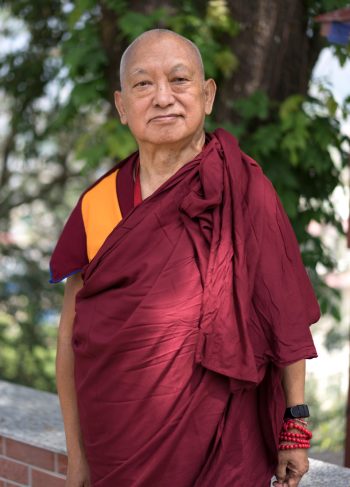
Lama Zopa Rinpoche at Kopan Monastery, Nepal, April 2020. Photo by Ven. Lobsang Sherab.
Lama Zopa Rinpoche continues his video teachings from Kopan Monastery in Nepal during the coronavirus pandemic. Here is a summary of the most recent teaching:
Lama Zopa Rinpoche begins this teaching explaining that we must utilize the happiness and pleasures of this life, not only our suffering and unfavorable conditions, in the path to ultimate happiness, which is liberation from samsara. Lojong (thought transformation) isn’t only for suffering. We can make life most beneficial whether we are suffering or happy by using both for sentient beings. Then everything we experience becomes meaningful.
You need compassion to do perfect work and to help sentient beings. We need to change our mind and make it soft. Rinpoche explains that the self-cherishing mind is like a rock, and we have to make it soft like cotton—full of great compassion and loving-kindness for others: bodhichitta.
All the holy actions of the buddhas manifest in the guru. If you disrespect the guru, it becomes disrespect to all the buddhas. After one becomes a disciple of the guru, if you belittle them, you cannot achieve enlightenment in this life, Rinpoche explains. As such, it is a very heavy negative karma resulting in suffering.
Serving the guru is the quickest way to achieve enlightenment.
Anger arising for even one second can destroy one’s merit and the cause of happiness. So many times a day we follow anger and destroy our merit. It is so difficult to practice patience, however, the enemy of virtue is anger. It blazes like a fire and completely burns the seed of liberation.
If we don’t know Dharma, particularly the lamrim, we become angry, engage in heresy, or commit the heaviest negative karma, criticizing and losing faith in the guru. If you do know lamrim and are practicing it well, one is so fortunate. Without Dharma, even worldly activities that look good at the beginning will fail in the end, including the homes we have, the bodies we cherish, and the careers we cultivate. However, with Dharma, the result never goes down, it always goes up until one achieves enlightenment. Understanding the suffering of samsara, one has to learn and study Dharma in order to achieve nirvana or enlightenment.
We invite you to go deeper into the topics presented here, plus many others, by watching Rinpoche’s video and reading the full transcript of Rinpoche’s teaching.
Watch Lama Zopa Rinpoche’s teaching “To Serve the Guru and Sentient Beings You Need to Know the Lamrim”:
https://youtu.be/oad_p5BJlhA
- Read the transcript of Rinpoche’s teaching “To Serve the Guru and Sentient Beings You Need to Know the Lamrim.”
- Engaging in the Deeds of a Bodhisattva (Bodhicharyavatara) by Shantideva
- Dedication verses for COVID-19 Crisis Teachings
Find more advice and video teachings by Lama Zopa Rinpoche from Kopan Monastery during the COVID-19 crisis and also links to videos in translation, transcripts, MP3s, and more:
https://fpmt.org/fpmt/announcements/resources-for-coronavirus-pandemic/advice-from-lama-zopa-rinpoche-for-coronavirus/
Practice advice from our teachers, Dharma study-from-home opportunities, and more can be found on the page “Resources for the Coronavirus Pandemic.”
Lama Zopa Rinpoche is the spiritual director of the Foundation for the Preservation of Mahayana Tradition (FPMT), a Tibetan Buddhist organization dedicated to the transmission of the Mahayana Buddhist tradition and values worldwide through teaching, meditation and community service.
- Tagged: advice from lama zopa rinpoche, coronavirus, covid-19, lama zopa rinpoche thought transformation video teaching, lojong, video
1
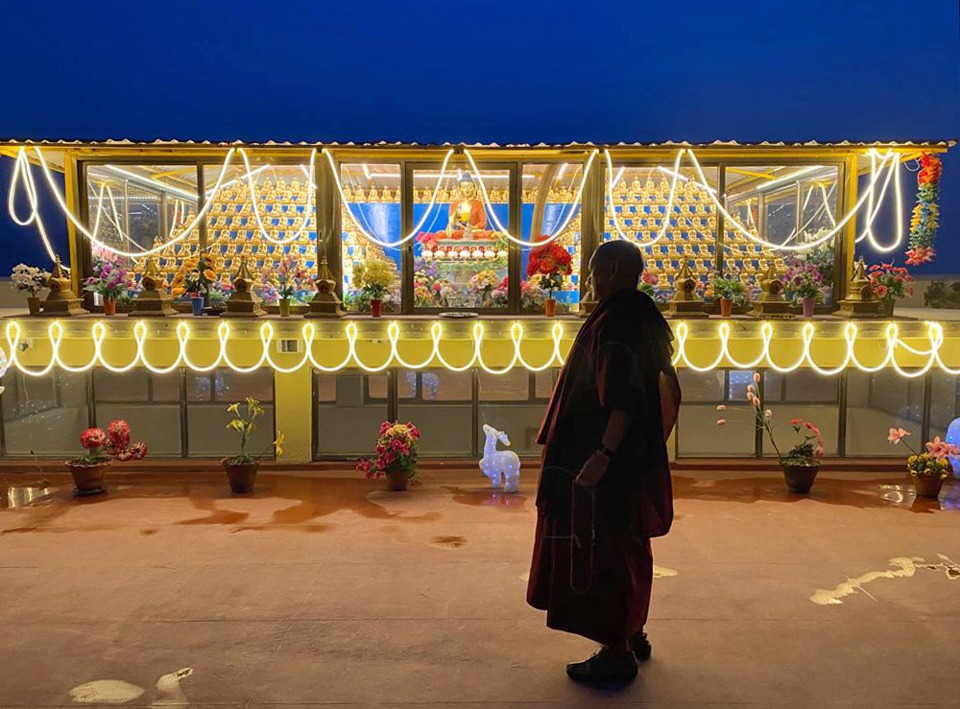
Lama Zopa Rinpoche circumambulating 1,000 buddhas at night, Kopan Monastery, Nepal April, 2020. Photo by Ven. Roger Kunsang.
Lama Zopa Rinpoche continues his video teachings from Kopan Monastery in Nepal during the coronavirus pandemic.
Geshe Yeshe Kunga begins this video explaining that Kopan Monastery is engaged in charitable work in response to the COVID-19 crisis and invites us to rejoice in the generosity of all involved with this. Even if we don’t engage in a charitable act directly, rejoicing is an easy and beneficial way to create merit and participate in the generosity.
Lama Zopa Rinpoche starts this teaching explaining that as long as one is in samsara, there is no way to be well. We are always experiencing suffering, whereas Dharma happiness is a blissful state of peace and the total cessation of obscurations and the completion of realizations.
Meeting Dharma in this life is so precious and allows one to have the three great meanings in life:
When we are lazy with our precious human life, and not practicing Dharma, it is very easy to engage in attachment, anger, and ignorance—the delusions—and create so much negative karma. You become like “firewood in hell,” Rinpoche explains. However, if we utilize our misery and suffering—including this virus or whatever problems arise—in the path to enlightenment with bodhichitta, we make life useful to every sentient being.
As a motivation for listening to the teachings, Rinpoche explains, one should think: I am going to see the deep suffering of samsara of myself and others. Then realizing the truth, emptiness, I can establish the motivation that my life is to benefit others. Therefore, I must liberate numberless sentient beings from the oceans of samsaric sufferings and bring them to peerless happiness, which is the total cessation of obscurations and completion of realizations, by myself alone. I must achieve enlightenment. Therefore, I’m going to listen to the teachings.
If you practice holy Dharma, even in this life, you will be happier. When you don’t practice Dharma, whatever you do doesn’t bring satisfaction. Since beginningless rebirths, we have been trying to get samsaric enjoyment but we are still suffering. If you want happiness, you must completely abandon desire. As long as you follow desire, you will never get satisfaction, only suffering. The most important thing to know is this: Less desire means more happiness in life. Otherwise, your Dharma practice doesn’t become real Dharma. You cheat yourself if you don’t renounce the world.
Rinpoche also explains the meaning of the saying: “no anger, no enemy.” If you avoid anger, there is no enemy in the world. So in that way, it is up to you whether or not you have enemies. If you have loving-kindness, great compassion, and bodhichitta for every being, then everyone becomes precious and kind, and there is no separation between yourself and others—no enemy.
We invite you to go deeper into the topics presented here, plus many others, by watching Rinpoche’s video and reading the full transcript of Rinpoche’s teaching.
Watch Lama Zopa Rinpoche’s teaching “Happiness Comes from Abandoning Desire”:
https://youtu.be/92rqMThrKqg
- Read the transcript of Rinpoche’s teaching “Happiness Comes from Abandoning Desire”
- Ten Innermost Jewels of the Kadampas by Zhabkar Tshogdrug Rangdröl
- Dedication verses for COVID-19 Crisis Teachings
Find more advice and video teachings by Lama Zopa Rinpoche from Kopan Monastery during the COVID-19 crisis and also links to videos in translation, transcripts, MP3s, and more:
https://fpmt.org/fpmt/announcements/resources-for-coronavirus-pandemic/advice-from-lama-zopa-rinpoche-for-coronavirus/
Practice advice from our teachers, Dharma study-from-home opportunities, and more can be found on the page “Resources for the Coronavirus Pandemic.”
Lama Zopa Rinpoche is the spiritual director of the Foundation for the Preservation of Mahayana Tradition (FPMT), a Tibetan Buddhist organization dedicated to the transmission of the Mahayana Buddhist tradition and values worldwide through teaching, meditation and community service.
- Tagged: advice from lama zopa rinpoche, coronavirus, covid-19, lama zopa rinpoche thought transformation video teaching, lojong, video
30
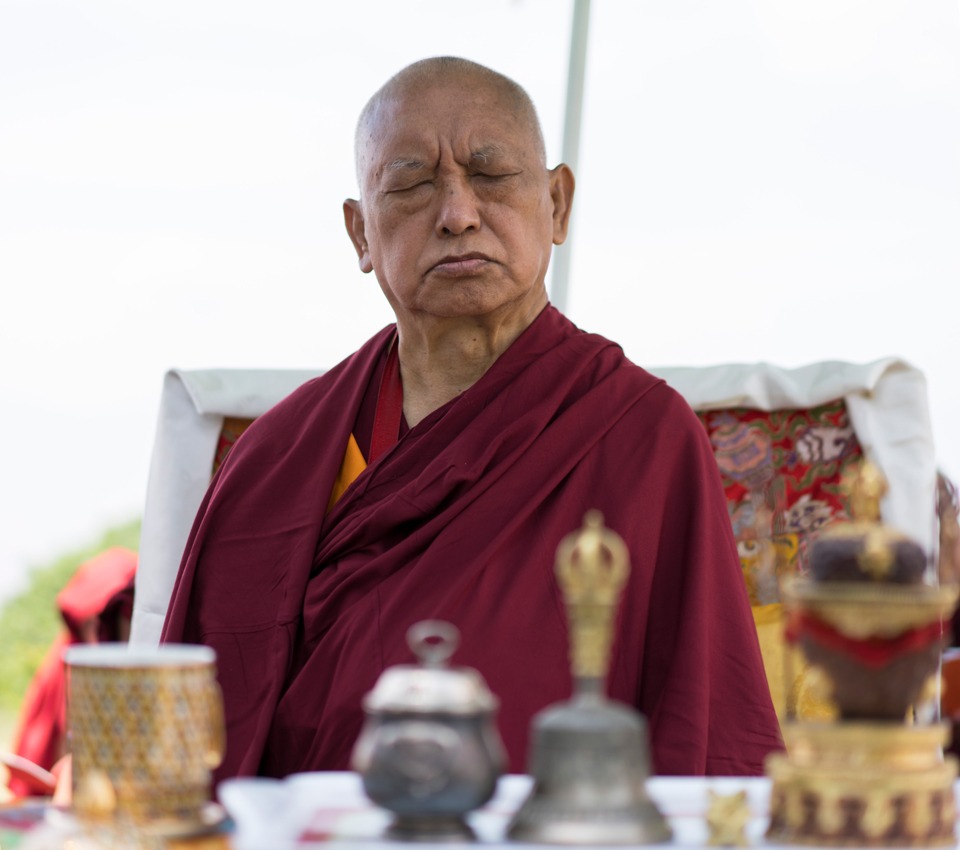
Lama Zopa Rinpoche doing an incense puja at Kopan Monastery, Nepal, April 2020. Photo by Ven. Lobsang Sherab.
Lama Zopa Rinpoche continues his video teachings from Kopan Monastery in Nepal during the coronavirus pandemic.
Lama Zopa Rinpoche begins this teaching discussing the meaning of lojong (thought transformation). Transforming suffering into happiness doesn’t mean you use it to stop some kind of temporary pain, or to receive temporary day-to-day pleasure in life. It means that you utilize the suffering of life on the path to enlightenment in order to achieve enlightenment for all sentient beings, to free them from oceans of samsaric suffering and bring them to enlightenment. When we use lojong in that way, its transformative potential becomes huge, “bigger than the sky.”
The more you know, the more you can understand your own suffering and other sentient beings’ suffering. Then, you can develop more compassion for others, and as you develop more compassion for others, you can achieve enlightenment more quickly.
Rinpoche discusses the text the Ten Innermost Jewels of the Kadampas. Keeping in mind and understanding the Kadampas’ ten innermost jewels destroys our hallucination about the world. The clinging of attachment, which is unbelievably strong, gets destroyed and becomes non-existent, Rinpoche explains, when you keep this text in mind.
From the Ten Innermost Jewels of the Kadampas:
The Four Entrustments (or Reliances)
I must entrust the depths of my attitude to the Dharma.
I must entrust the depths of the Dharma to the beggar.
I must entrust the depths of the beggar to death.
I must entrust the depths of death to the cave.
The Three Vajras
I must proceed well with the uncaptured vajra.
I must leave behind the shameless vajra.
I must be accompanied by the transcendent wisdom vajra.
The Three Practices of Expulsion, Reaching, and Striving
I must practice being expelled from the rank of humans,
reaching for the rank of dogs,
And striving for the rank of devas.
Rinpoche continues the teaching explaining how desire doesn’t bring happiness. If you think all the time that you want to be happy, that you want to be comfortable, then you don’t get happiness. However, when you think that you don’t need anything, your mind becomes free and peaceful. When you avert thoughts of desire, happiness starts.
The most important education one can receive is how to have a good heart. So that from a young age, not only your words, but your actions, are virtuous. When you die, Rinpoche says, you will have no worry because you lived life with a good heart, serving others. Because of the good heart, the next life will be successful, and you will have everything you need. By serving others, your wishes will be fulfilled.
We invite you to go deeper into the topics presented here, plus many others, by watching Rinpoche’s video and reading the full transcript of Rinpoche’s teaching.
Watch Lama Zopa Rinpoche’s teaching “The Ten Innermost Jewels of the Kadampas and Give Up Desire”:
https://youtu.be/0XGnJNydyfs
- Read the transcript of Rinpoche’s teaching “The Ten Innermost Jewels of the Kadampas and Give Up Desire”
- Engaging in the Deeds of a Bodhisattva by Shantideva
- Ten Innermost Jewels of the Kadampas by Zhabkar Tshogdrug Rangdröl
- Dedication verses for COVID-19 Crisis Teachings
Find more advice and video teachings by Lama Zopa Rinpoche from Kopan Monastery during the COVID-19 crisis:
https://fpmt.org/fpmt/announcements/resources-for-coronavirus-pandemic/advice-from-lama-zopa-rinpoche-for-coronavirus/
Practice advice from our teachers, Dharma study-from-home opportunities, and more can be found on the page “Resources for the Coronavirus Pandemic.”
Lama Zopa Rinpoche is the spiritual director of the Foundation for the Preservation of Mahayana Tradition (FPMT), a Tibetan Buddhist organization dedicated to the transmission of the Mahayana Buddhist tradition and values worldwide through teaching, meditation and community service.
- Tagged: advice from lama zopa rinpoche, coronavirus, covid-19, lama zopa rinpoche thought transformation video teaching, lojong, ten innermost jewels of the kadampas, video
28
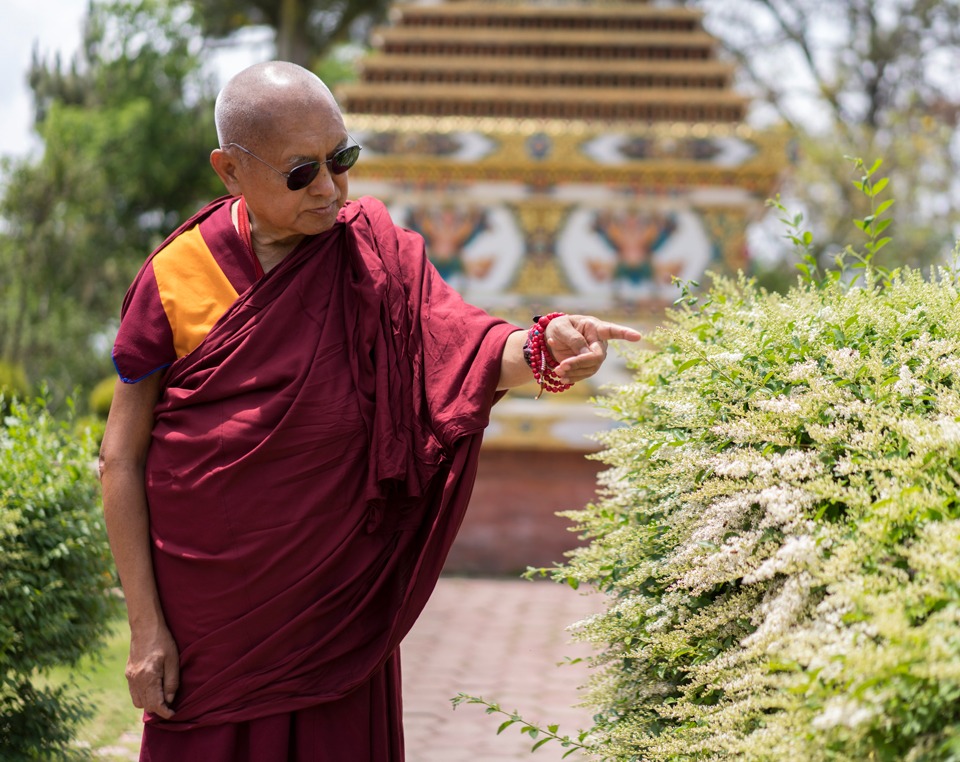
Lama Zopa Rinpoche looking at bees on a bush at Kopan Monastery, Nepal, April 2020. Photo by Ven. Lobsang Sherab.
Lama Zopa Rinpoche continues his video teachings from Kopan Monastery in Nepal during the coronavirus pandemic.
Lama Zopa Rinpoche begins this teaching discussing how to make life most beneficial, useful, and easy—particularly to other sentient beings. Even if we are having a happy life and enjoying it, it would be unfortunate if we wasted the opportunity of this precious human life.
Rinpoche tells the story of a former abbot of Sera Je Monastery, who survived prison following the Chinese invasion of Tibet by eating undigested beans found in the feces of Chinese prison workers left in the field near the prison. He was offered so little food, but with the beans in the feces, he was able to survive. He was educated at Sera Monastery, became a Madhyamaka and Prajnaparamita expert, and had nearly a thousand students. Many highly educated geshes, some who now serve in FPMT centers and elsewhere, as well as reincarnated lamas, were all students of his. Through the hardship of prison and hunger he was able to bring the teachings of Buddha to so many monks who have also had very beneficial lives teaching others as well.
When everything we do is in service to the ignorance holding the “I” as real, we are a slave and attachment is the master. This is who we are working for (self-cherishing), and for whom we create the cause of all the suffering and have to experience all the suffering. Even if you study Dharma but are still clinging to the happiness of this life, you aren’t practicing holy Dharma, it is worldly Dharma, non-virtue. Giving up attachment, clinging to this life, is the very beginning Dharma.
Before the karma is ripened, there is so much a human being can do: purification, collection of merit, and actualizing the path. But once it is ripened, because you didn’t get the practice done, you must experience it.
We need to practice holy Dharma to achieve peace and real happiness and to be free from all the problems and suffering of the world. From that happiness, one can achieve liberation from samsara—a blissful state of peace for yourself and ultimate happiness, the total cessation of obscurations and the completion of realizations.
Remembering impermanence and death at the beginning makes it possible to follow holy Dharma. In the middle, it is necessary to actualize the path. And at the end, remembering death and impermanence makes it possible to achieve enlightenment. This frees us from the poison of the eight worldly concerns. The realization of death and impermanence is so important. We shouldn’t think, “Oh, this doesn’t matter, it is only a beginning Dharma practice.” That is very foolish.
We invite you to go deeper into the topics presented here, plus many others, by watching Rinpoche’s video and reading the full transcript of Rinpoche’s teaching.
Watch Lama Zopa Rinpoche’s teaching “The Very Beginning Dharma Is Giving Up the Attachment Clinging to This Life”:
https://youtu.be/4S9rlzUOSyI
- Read the transcript of Rinpoche’s teaching “The Very Beginning Dharma Is Giving Up the Attachment Clinging to This Life”
- Recognizing the False I (PDF,.epub, .mobi) is a commentary written by Lama Zopa Rinpoche with a set of short meditations to help students identify the object to be refuted—what Rinpoche calls “the false I”—during reflections on emptiness
- Dedication verses for COVID-19 Crisis Teachings
Find more advice and video teachings by Lama Zopa Rinpoche from Kopan Monastery during the COVID-19 crisis:
https://fpmt.org/fpmt/announcements/resources-for-coronavirus-pandemic/advice-from-lama-zopa-rinpoche-for-coronavirus/
Practice advice from our teachers, Dharma study-from-home opportunities, and more can be found on the page “Resources for the Coronavirus Pandemic.”
Lama Zopa Rinpoche is the spiritual director of the Foundation for the Preservation of Mahayana Tradition (FPMT), a Tibetan Buddhist organization dedicated to the transmission of the Mahayana Buddhist tradition and values worldwide through teaching, meditation and community service.
- Tagged: advice from lama zopa rinpoche, coronavirus, covid-19, emptiness, lama zopa rinpoche thought transformation video teaching, video
27
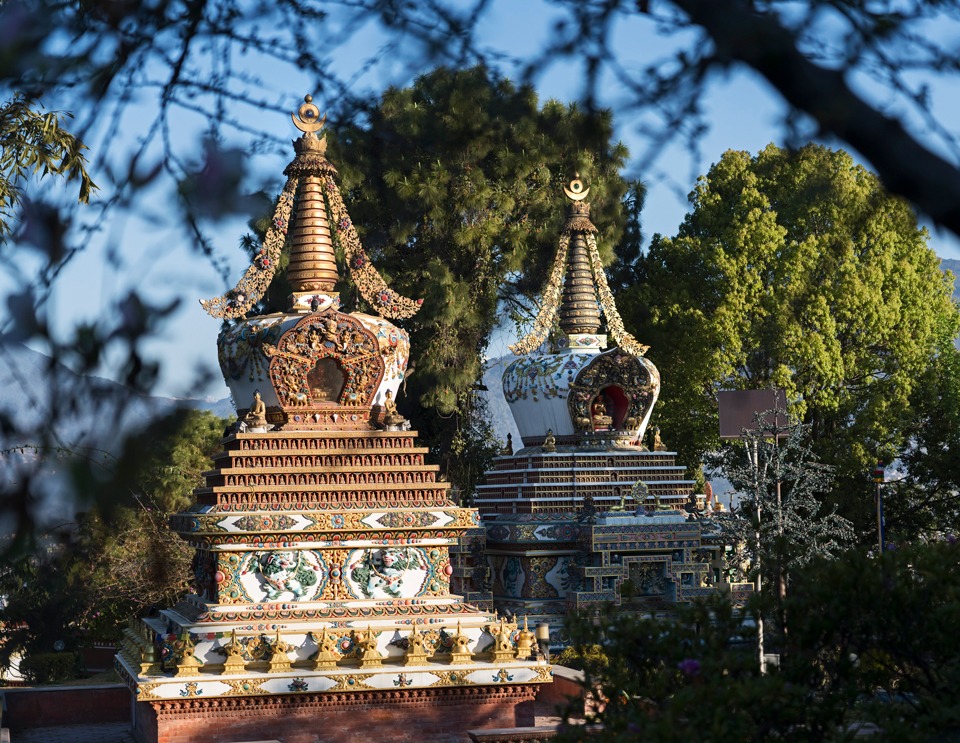
The stupas of Khensur Rinpoche Lama Lhundrup (left) and Geshe Lama Konchog at Kopan Monastery, Nepal, April 2020. Photo by Ven. Lobsang Sherab.
Lama Zopa Rinpoche continues his video teachings from Kopan Monastery in Nepal during the coronavirus pandemic.
This video begins with a brief biography of Khensur Rinpoche Lama Lhundrup, the former abbot of Kopan Monastery in Nepal, who arrived at Kopan in 1973 and oversaw the growth and development of the monastery and nunnery for almost forty years, until his passing in 2011. Ven. Thubten Kunkhen, who served as Khensur Rinpoche’s attendant for two decades, shares stories of the much loved abbot’s history, accomplishments, and qualities, and introduces seven-year-old Thubten Rigsel Rinpoche, the recognized reincarnation of Khensur Rinpoche Lama Lhundrup.
Lama Zopa Rinpoche begins this teaching discussing the number of people who have died in the United States due to the coronavirus. He then asks why the number is going down. Rinpoche explains that this is because people don’t know what is true and what is false; they use their whole life to create the cause of suffering. The right view is karma. From virtuous thoughts and actions, the result is happiness. From non-virtuous thoughts and actions, the result is suffering and problems.
Those who have met the Dharma are unbelievably fortunate because they can use their precious human bodies to achieve enlightenment. Using the example of Milarepa—who who didn’t even have one rupee to his name, lived on nettles and water, and faced many hardships in life while practicing Dharma—Rinpoche explains that if one has the will, perseverance, and patience, one can achieve enlightenment in one lifetime. Even if you don’t meet the Dharma, one still can think that the human body is so precious because you can cause happiness to others.
We wake up in the morning clinging and grasping to the happiness of this life. We get up, get dressed, wash up, eat breakfast, and go to work with the motivation of attachment and non-virtue. We think: When can I be happy? Meanwhile, many Tibetans recite OM MANI PADME HUM and engage in other Dharma practices while doing daily activities. This makes life unbelievably meaningful with constant purification and collection of merit.
The most important thing to practice is compassion. Without it, your life becomes empty.
We have to be very careful. If from the beginning we practiced Dharma, we wouldn’t need to experience the virus. There are people all over the world who won’t get the virus or die from it, while thousands of others die every day. This is why we have to watch our mind all the time—to police the mind. You are the guru, mother, father, and bodyguard of your own mind. When you follow delusion, you harm yourself. When you follow virtue, such as renunciation, bodhichitta, and right view, you are benefiting yourself and therefore benefiting numberless sentient beings, especially with bodhichitta.
All of the harm we experience comes from harming others in the past; and all happiness depends on what we do with our mind. Everything we experience depends on our way of thinking right now. Therefore, continual purification is so important. There are many practices one can do for purification, including Vajrasattva practice and prostrations to the Thirty-Five Confession Buddhas, and so forth, but the most powerful thing one can do for purification is to follow your guru’s advice and make your guru’s mind most happy.
We invite you to go deeper into the topics presented here, plus many others, by watching Rinpoche’s video and reading the full transcript of Rinpoche’s teaching.
Watch Lama Zopa Rinpoche’s teaching “If We Had Been Careful of Karma, There Would Be No Reason for the Virus to Happen”:
https://youtu.be/kbcjMW6kQ28
- Read the transcript of Rinpoche’s teaching “If We Had Been Careful of Karma, There Would Be No Reason for the Virus to Happen.”
- Dedication verses for COVID-19 Crisis Teachings
Find more advice and video teachings by Lama Zopa Rinpoche from Kopan Monastery during the COVID-19 crisis:
https://fpmt.org/fpmt/announcements/resources-for-coronavirus-pandemic/advice-from-lama-zopa-rinpoche-for-coronavirus/
Practice advice from our teachers, Dharma study-from-home opportunities, and more can be found on the page “Resources for the Coronavirus Pandemic.”
Lama Zopa Rinpoche is the spiritual director of the Foundation for the Preservation of Mahayana Tradition (FPMT), a Tibetan Buddhist organization dedicated to the transmission of the Mahayana Buddhist tradition and values worldwide through teaching, meditation and community service.
- Tagged: advice from lama zopa rinpoche, bodhichitta, coronavirus, covid-19, khensur rinpoche lama lhundrup, lama zopa rinpoche thought transformation video teaching, thubten kunkhen, thubten rigsel, thubten rigsel rinpoche, video
26
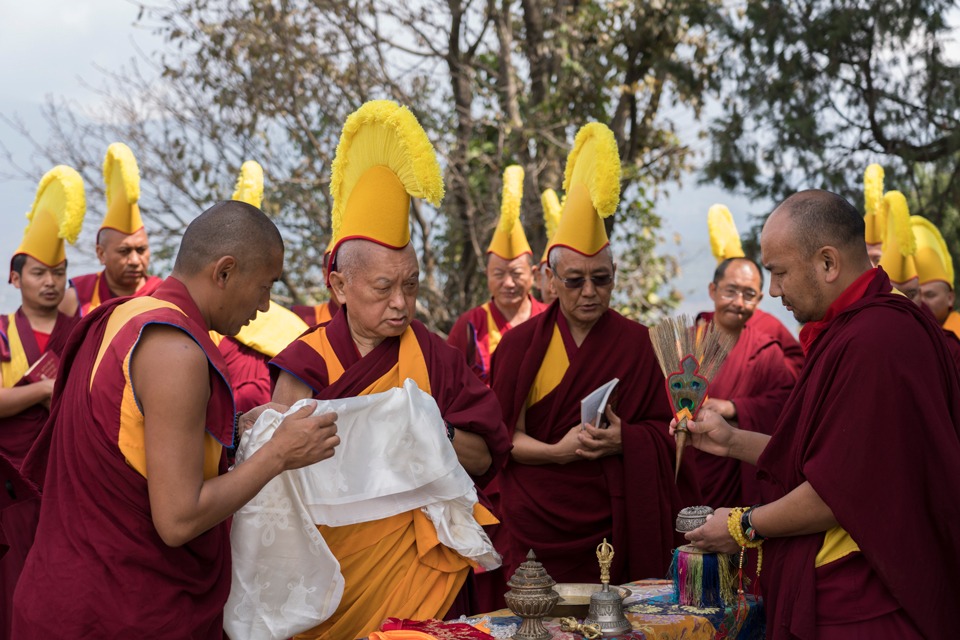
Lama Zopa Rinpoche and Khen Rinpoche Geshe Chonyi with senior Kopan monks doing Nolsang to protect and mitigate the COVID-19 pandemic, Kopan Monastery, March 2020. Photo by Ven. Lobsang Sherab.
Now is the time to practice Dharma! This is what Lama Zopa Rinpoche is stressing during the COVID-19 crisis.
In regular video teachings from Kopan Monastery in Nepal, Rinpoche offers a consistent message that we can use these difficult times to strengthen and deepen our Dharma practice. Through discussions of compassion, emptiness, and thought transformation, and many inspiring stories, Rinpoche helps guide our understanding of how this global crisis can be transformed so that all can benefit. He urges us to go beyond engaging with the teachings as theory and to put them into actual practice in our daily lives.
In addition, these videos feature short introductory teachings from monks at Kopan Monastery, which is celebrating its 50th anniversary. Having glimpses into life at the monastery and the activities of the monks also provides an opportunity to connect more deeply with Kopan—the “bedrock” from which the international FPMT organization arose.
If you haven’t taken advantage of these videos yet, you can find them—plus summaries of the teachings, the videos in translation (Chinese, French, Italian, Russian, and Spanish), transcripts, additional advice from Rinpoche, and materials and resources to further explore the themes discussed—all in one page: “Advice from Lama Zopa Rinpoche for the Coronavirus Pandemic.”
Visit this regularly updated page, and through the wisdom of the Buddha’s teachings, discover the courage and strength to make the most of this challenging time.
Find links to these new videos and Rinpoche’s advice, plus links to many other resources on “Advice from Lama Zopa Rinpoche for the Coronavirus Pandemic”:
https://fpmt.org/fpmt/announcements/resources-for-coronavirus-pandemic/advice-from-lama-zopa-rinpoche-for-coronavirus/
Lama Zopa Rinpoche is the spiritual director of the Foundation for the Preservation of Mahayana Tradition (FPMT), a Tibetan Buddhist organization dedicated to the transmission of the Mahayana Buddhist tradition and values worldwide through teaching, meditation and community service.
- Tagged: advice from lama zopa rinpoche, bodhichitta, coronavirus, covid-19, lama zopa rinpoche thought transformation video teaching, video
24
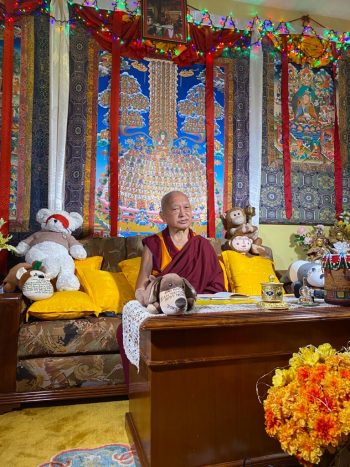
Lama Zopa Rinpoche teaching from his room at Kopan Monastery, Nepal, April 2020. Rinpoche explains that the teddy bear behind him is wearing a mask because he is afraid to look at the world. Photo by Ven. Roger Kunsang.
Lama Zopa Rinpoche continues his video teachings from Kopan Monastery in Nepal during the coronavirus pandemic.
This video beings with Ven. Thubten Kunkhen of Kopan Monastery giving a short biography of the great yogi Geshe Lama Konchog.
Lama Zopa Rinpoche begins his teaching discussing lojong, or thought transformation. This means transforming all problems into happiness, not temporary happiness or today’s happiness, but ultimate happiness, which is liberation from samsara forever, Buddhahood. To understand the term “enlightenment,” one has to study the meaning of total awakening: that one has completed the realizations and there is nothing more to achieve, nothing more to learn. That means complete peerless happiness, forever.
This perfect, unbelievably rare human rebirth is a one-time opportunity to practice, receive teachings, and actualize the path, Rinpoche teaches. This is why it is so important to bear hardships, however difficult, in order to actualize the path within our mind. Then the mind becomes the path to enlightenment.
We are totally deceived by attachment, which is a hallucinated mind, a wrong concept. If you have not actualized Dharma at the time of death, suddenly you realize that you should have studied Dharma, but there is no time. You realize you should have practiced seriously instead of casually experimenting with Dharma, like you would restaurants or a trip around the world.
Impermanence is easy to understand and, Rinpoche emphasizes, it is so important! It is difficult to control the mind and the delusions that our mind has been habituated with since beginningless rebirths. The time of death is uncertain. The best thing to think is that you might die today or tomorrow. Meditation on impermanence isn’t difficult, but we must think about it from our heart. Awareness of impermanence and death helps us receive realizations and complete the path. Otherwise, if you learn Dharma only intellectually, Rinpoche warns, your whole life is still meaningless actions of nonvirtue.
The purpose of this life is to benefit others. It is unbelievable what one can do. What you do with an ultimate good heart, bodhichitta, makes the best most meaningful life. Wisdom realizing emptiness is the only remedy for the wrong concept from where all suffering comes from—ignorance.
A Buddha doesn’t have negative imprints left by ignorance, which projects the hallucination of true existence. Bodhisattvas, even arya bodhisattvas, do. However, they know it isn’t real. It is like dreaming but knowing you are dreaming. They know it is a hallucination because they know nothing exists from its own side—they have a direct perception of emptiness.
We invite you to go deeper into the topics presented here, plus many others, by watching Rinpoche’s video and reading the full transcript of Rinpoche’s teaching.
Watch Lama Zopa Rinpoche’s teaching “If You Don’t Remember Impermanence-Death, Your Life Becomes a Trip and Wisdom Eliminates the Two Obscurations”:
https://youtu.be/2HEyCke6rTE
- Read the transcript of Rinpoche’s teaching
- The text for the Sur practice referred to in this teaching is forthcoming.
- Recognizing the False I (PDF,.epub, .mobi) is a commentary written by Lama Zopa Rinpoche with a set of short meditations to help students identify the object to be refuted—what Rinpoche calls “the false I”—during reflections on emptiness.
- Dedication verses for COVID-19 Crisis Teachings
Find more advice and video teachings by Lama Zopa Rinpoche from Kopan Monastery during the COVID-19 crisis:
https://fpmt.org/fpmt/announcements/resources-for-coronavirus-pandemic/advice-from-lama-zopa-rinpoche-for-coronavirus/
Practice advice from our teachers, Dharma study-from-home opportunities, and more can be found on the page “Resources for the Coronavirus Pandemic.”
Lama Zopa Rinpoche is the spiritual director of the Foundation for the Preservation of Mahayana Tradition (FPMT), a Tibetan Buddhist organization dedicated to the transmission of the Mahayana Buddhist tradition and values worldwide through teaching, meditation and community service.
- Tagged: advice from lama zopa rinpoche, bodhichitta, coronavirus, covid-19, geshe lama konchog, lama zopa rinpoche thought transformation video teaching, thubten kunkhen, video
23
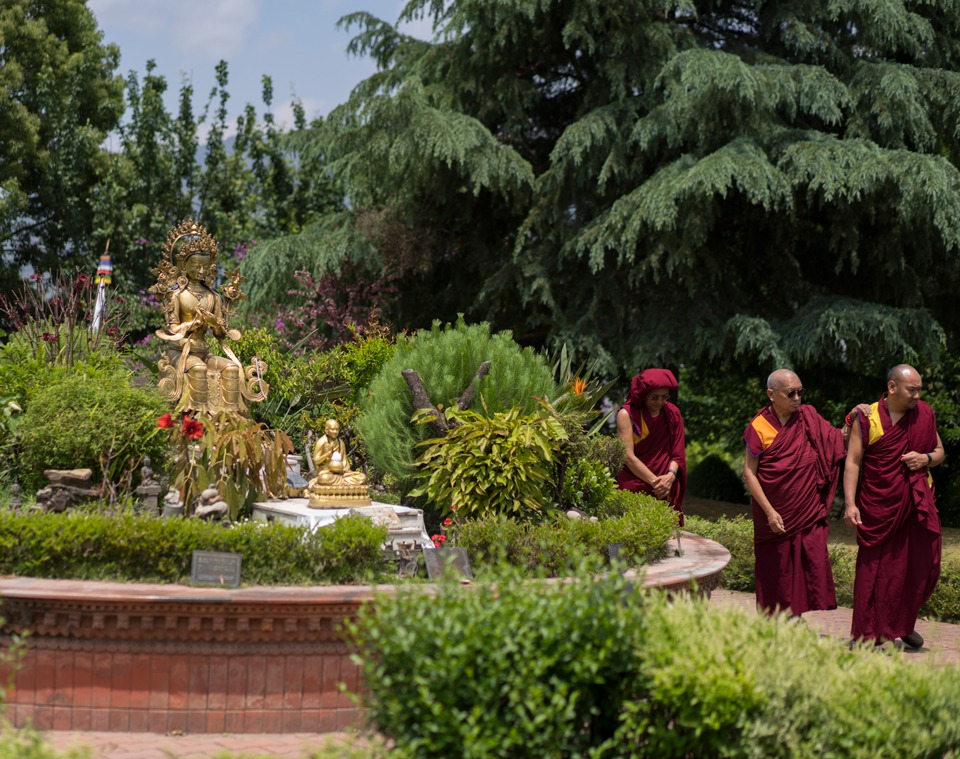
Lama Zopa Rinpoche walking the grounds at Kopan Monastery, Nepal, April 2020. Photo by Ven. Lobsang Sherab.
Lama Zopa Rinpoche continues his video teachings from Kopan Monastery in Nepal during the coronavirus pandemic.
Lama Zopa Rinpoche begins his teaching discussing how many people have died around the world from the coronavirus. This is because life is in the nature of impermanence, and we are born under the control of delusion and karma. However, those who have the karma to receive correct teachings and listen, reflect, meditate, and actualize the four noble truths correctly can become free from suffering and the cause of suffering. Through actualizing wisdom directly perceiving emptiness, they can cease the seed of delusion and karma.
Those of us born under the control of delusion and karma didn’t get to develop the mind and actualize Buddha’s teachings, and our lives have been under the control of laziness and a wrong concept of permanence, Rinpoche says. Even if we accept that we are going to die, when we wake up in the morning we think, I will live for a long time. Because of this hallucination of life, this wrong concept of permanence, Dharma is left out of life. Controlling and subduing the mind is left out, even if one knows the words from sutra and tantra, philosophy, lamrim, etc., we don’t practice and experience it. This is like having medicine but not taking it.
However many years we have left of life, half of those years are finished while sleeping. Rinpoche stresses that we can use this time for practicing Dharma, even though it is difficult. With a Dharma motivation, particularly with bodhichitta, even sleeping becomes the cause for enlightenment.
A person who generates bodhichitta, or at least the motivation of bodhichitta, is most lucky. Even if you meditate on bochichitta, it covers all sentient beings. There is no nationality, no race, nothing like that. Friends, enemies, and strangers are included.
Given the current situation in the world with the virus and all of the suffering, there is no choice but to develop compassion. Then, when considering karma, that this is due to ignorance not knowing Dharma, it makes you feel deeper compassion for others. This inspires you to abandon negative karma—the cause of suffering—and to practice virtue—the cause of happiness.
The doctors and nurses who dedicate their lives to others, even though there is danger that they could get the contagious disease, from their hearts they want to serve and take care. Even if they get the disease and die, they will never be reborn in the lower realms. This is the best thing for those who sincerely want to help—they are saved from the lower realms and will go to a pure land or have the opportunity to have a higher rebirth such as a deva or human. We all must die, so to die with compassion for others, this is a very good death. Rinpoche reminds that His Holiness says that dying with bodhichitta is the best death.
One tries to have a long healthy life—watching the food we eat, going for walks, taking time off from working, etc. So, you cherish your life, but the real “I” you cherish is not there. However, Rinpoche says, any charity you offer to others that is bigger than a hair—any charity you give to others—you are offering your life, and from this you get happiness.
Do whatever you can to help animals and people: even a tiny insect like an ant, or a tiny being like a fishing worm; even a small gesture such as carrying heavy luggage for someone or offering your seat on the train or bus. From such a small virtue, the result is happiness.
In conclusion, on the basis of not causing harm, you serve others. The best thing is bodhichitta practice.
We invite you to go deeper into the topics presented here, plus many others, by watching Rinpoche’s video and reading the full transcript of Rinpoche’s teaching.
Watch Lama Zopa Rinpoche’s teaching “Coronavirus Leaves Us No Choice But to Develop Compassion and 80,000 Eons of Benefit from Making Charity”:
https://youtu.be/u6YSt0xytYg
- Read the transcript of Rinpoche’s teaching “Coronavirus Leaves Us No Choice But to Develop Compassion and 80,000 Eons of Benefit for Making Charity.”
- Rinpoche quotes verses from Khunu Lama Rinpoche’s Verses in Praise of Bodhichitta (published in English as Vast as the Heavens, Deep as the Sea)
- Dedication verses for COVID-19 Crisis Teachings
- For more advice on practicing bodhichitta in everyday life, read Lama Zopa Rinpoche’s Cultivating Mindfulness of Bodhichitta in Daily Activities.
Find more video teachings by Lama Zopa Rinpoche from Kopan Monastery during the COVID-19 crisis:
https://fpmt.org/media/streaming/teachings-of-lama-zopa-rinpoche/lama-zopa-rinpoche-teachings-in-kopan-2020-during-covid-19-crisis/
Practice advice from our teachers, Dharma study-from-home opportunities, and more can be found on the page “Resources for the Coronavirus Pandemic.”
Lama Zopa Rinpoche is the spiritual director of the Foundation for the Preservation of Mahayana Tradition (FPMT), a Tibetan Buddhist organization dedicated to the transmission of the Mahayana Buddhist tradition and values worldwide through teaching, meditation and community service.
- Tagged: advice from lama zopa rinpoche, bodhichitta, coronavirus, covid-19, lama zopa rinpoche thought transformation video teaching, video
21
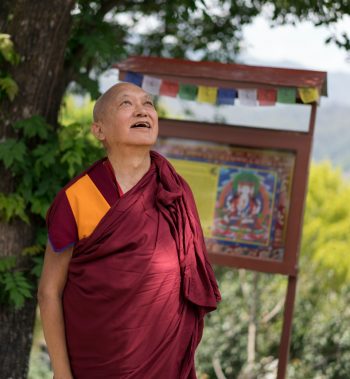
Lama Zopa Rinpoche at Kopan Monastery, Nepal, April 2020. Photo by Ven. Lobsang Sherab.
Lama Zopa Rinpoche continues his video teachings from Kopan Monastery in Nepal during the coronavirus pandemic.
This video begins with Losang Namgyal Rinpoche sharing some thoughts about this difficult time due to the coronavirus. He suggests we not only need to stay safe and healthy, but should remember that we have this precious human rebirth. We must also remember impermanence and karma, and this will help us to overcome. He reminds us of the incredible service being offered by health care professionals around the world who deserve our great respect and good heart. And for those who are sick from this virus, we must have great compassion.
Lama Zopa Rinpoche begins his teaching discussing how many people have died from the coronavirus in the United States. He then explains that people all over the world will die—from sickness, famine, in war, due to killing, etc. In fact, the entire world will end sooner or later and anything that grows or was built, will one day end. This is the nature of impermanence.
Rinpoche says that this virus should make us think more about karma. The virus, and the entire world coming into existence, this all came from the mind. Because everything comes from the mind, how to stop suffering also comes from the mind. Rinpoche explains that there is individual suffering, but there are also world problems, called collective karma. In Buddhism, you can stop the suffering and create happiness. One can do this by understanding, learning, and hearing from a perfect teacher. Then by reflecting and meditating, one can actualize the path. Your mind becomes the path to overcome the oceans of suffering in samsara, including the virus, which is only one thing, one suffering.
In the West we are always distracting ourselves from the suffering of death. But when it comes, we have to experience it. If you haven’t met Dharma, you don’t want to think about it, and when you do, your thoughts are only of fear. There’s no method or preparation, just fear. So we ignore it.
Even though we wish to never be separated from that which brings us comfort—including our family, clothing, money, and possessions—at the time of death we will definitely be separated from everything we enjoy. These things cheat us, and we have to give them up at the time of death.
What this virus is telling us is that we must practice Dharma. The virus came from the mind. But the mind also creates happiness, Rinpoche reminds us, not just suffering. A positive mind creates happiness. To practice Dharma means to cultivate a happy mind. Buddha’s teachings persuade us to overcome suffering. Not only this virus, but all suffering—including the suffering of death, suffering of rebirth, suffering of old age, suffering of sickness, and the suffering of pain. Buddha’s teachings also liberate us from the suffering of change of samsaric pleasures, which become the suffering of pain in the end. Since beginningless rebirths up until now we haven’t had even a one-second break from suffering. From birth the suffering of pain, and then the suffering of change, arises.
All the problems of the world are giving us instruction to practice Dharma, to meditate. By meditation, Rinpoche means making the mind more familiar with virtue, the cause of happiness—making the mind become the path to enlightenment.
In conclusion, Rinpoche gives some advice on what to do if we lose our brave heart, feel weak, lose enthusiasm about working for others, become lazy, or get depressed: Remember bodhichitta. This will transform one’s life.
Rinpoche then leads a powerful dedication to actualize bodhichitta, with prayers for the sick and those who have died, for Lama Tsongkhapa to be our direct guru in all future lives, and to cultivate the bodhisattva attitude of using our very life to benefit others, to regard all sentient beings as most precious.
We invite you to go deeper into the topics presented here, plus many others, by watching Rinpoche’s video and reading the full transcript of Rinpoche’s teaching.
Watch Lama Zopa Rinpoche’s video teaching “All the Problems in the World, Including the Coronavirus, Are Telling Us to Practice Dharma”:
https://youtu.be/OwX9ew7wLb4
- Read the transcript of Rinpoche’s teaching “All the Problems in the World, Including the Coronavirus, Are Telling Us to Practice Dharma.”
- Rinpoche quotes verses from Khunu Lama Rinpoche’s Verses in Praise of Bodhichitta, published in English as Vast as the Heavens, Deep at the Sea.
- Dedication verses for COVID-19 Crisis Teachings
Find more video teachings by Lama Zopa Rinpoche from Kopan Monastery during the COVID-19 crisis:
https://fpmt.org/media/streaming/teachings-of-lama-zopa-rinpoche/lama-zopa-rinpoche-teachings-in-kopan-2020-during-covid-19-crisis/
Practice advice from our teachers, Dharma study-from-home opportunities, and more can be found on the page “Resources for the Coronavirus Pandemic.”
Lama Zopa Rinpoche is the spiritual director of the Foundation for the Preservation of Mahayana Tradition (FPMT), a Tibetan Buddhist organization dedicated to the transmission of the Mahayana Buddhist tradition and values worldwide through teaching, meditation and community service.
- Tagged: advice from lama zopa rinpoche, bodhichitta, coronavirus, covid-19, emptiness, impermanence and death, karma, lama zopa rinpoche thought transformation video teaching, losang namgyal rinpoche, video
19
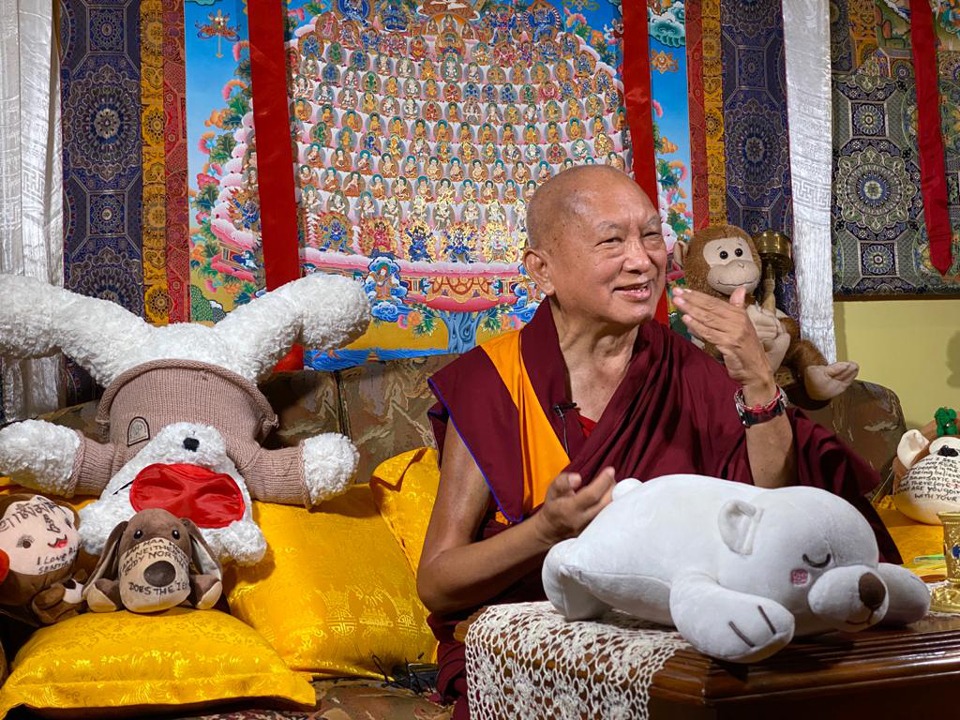
Lama Zopa Rinpoche teaching from his room at Kopan Monastery with his furry friends, Nepal, April 2020. Photo by Ven. Roger Kunsang.
Lama Zopa Rinpoche continues his video teachings from Kopan Monastery in Nepal during the coronavirus pandemic.
This video begins with another practical example from a young Kopan monk about how we can transform everyday activities into bodhichitta mindfulness. While cutting up vegetables or food for a meal, one can think: I am cutting all the sentient beings’ ignorance and delusions with this knife.
Lama Zopa Rinpoche begins this teaching by explaining that bodhichitta is a remedy for unfavorable conditions, undesirable sufferings, and problems. Rinpoche then quotes the great Buddhist master Shantideva’s Bodhicharyavatara: “If you want to guide yourself and others, exchange yourself with others.” Right now, most of us live our lives cherishing ourselves, “I,” more than others. We let others suffer while we get happiness.
But where is this “I” that we cherish so dearly?
Rinpoche explains that if you look for the “I”—from the head all the way down to the toes, you won’t find it in the body or in the mind, or in the five aggregates together. If you analyze it, you will find that this is a big inaccuracy and shows how “false” we have lived our lives. You cannot find the real “I.” Rinpoche says that the biggest false, the biggest shock, the biggest ignorance is that this “I” which we cherish more than everyone else, doesn’t even exist.
The root of the suffering and problems that exist in the world come from the mind, created by wrong concepts. We typically don’t think that our ignorance is the cause of our suffering; we think it comes from outside. We ask why this virus has come. The most important discovery is that all sufferings come from the mind. Because of ignorance, we have been suffering in beginningless rebirths up until now, Rinpoche explains. And if we don’t do anything, if we believe in the hallucinations of this life, we reincarnate again and again without end.
One needs good karma, merit, to meet the Dharma and receive correct teachings from a legitimate guru. The West doesn’t talk much about merit, Rinpoche says. There is a lack of concern about merit—creating the cause for happiness.
The method for letting go of the “I,”—where all the problems come from—is to exchange oneself with others, to cherish others. When your activities of the body, speech, and mind are done with bodhichitta, you collect not only skies of merit but more than skies of merit. This merit helps to realize emptiness. Then, one is able to cease the disturbing thought obscurations. In this way, bodhichitta helps achieve enlightenment. Rinpoche asks us to remember this deep in our hearts: When you do everything with bodhichitta—the ultimate good heart wishing to benefit all sentient beings and free them from the oceans of suffering—then you collect more than skies of merit every time.
Of course, Rinpoche explains, the object from whom you collect the most merit from is the guru. Even the tiniest offering to Buddha, even one tiny Christmas light, one nut or raisin, or one drop of water, this becomes the cause for enlightenment. This benefit is for yourself, but then, if you dedicate the merit to numberless sentient beings, this causes so much happiness for them. Rinpoche asks: If that is not the happiest life, what else can be the happiest life?
Rinpoche says again, “The most important thing is bodhichitta. If you want to help yourself and you want to help others, the ultimate thing is exchanging oneself and others.” Rinpoche concludes this teaching quoting from the Bodhicharyavatara that one’s practice of exchanging self with others should be done secretly. Rinpoche explains that this is to help with arrogance, because once we start asserting, “I am this,” there is no Dharma practice.
We invite you to go deeper into the topics presented here, plus many others, by watching Rinpoche’s video and reading the full transcript of Rinpoche’s teaching.
Watch Lama Zopa Rinpoche’s video teaching “If You Want to Guide and Help Others, Exchange Yourself with Others”:
https://youtu.be/VYYB1QQG9gE
- Read the transcript of Rinpoche’s teaching “If You Want to Guide and Help Others, Exchange Yourself with Others.”
- Rinpoche quotes verses from Khunu Lama Rinpoche’s Verses in Praise of Bodhichitta, published in English as Vast as the Heavens, Deep at the Sea.
- Dedication verses for COVID-19 Crisis Teachings
Find more video teachings by Lama Zopa Rinpoche from Kopan Monastery during the COVID-19 crisis:
https://fpmt.org/media/streaming/teachings-of-lama-zopa-rinpoche/lama-zopa-rinpoche-teachings-in-kopan-2020-during-covid-19-crisis/
Practice advice from our teachers, Dharma study-from-home opportunities, and more can be found on the page “Resources for the Coronavirus Pandemic.”
Lama Zopa Rinpoche is the spiritual director of the Foundation for the Preservation of Mahayana Tradition (FPMT), a Tibetan Buddhist organization dedicated to the transmission of the Mahayana Buddhist tradition and values worldwide through teaching, meditation and community service.
- Tagged: advice from lama zopa rinpoche, bodhichitta, bodhichitta mindfulness, coronavirus, covid-19, emptiness, lama zopa rinpoche thought transformation video teaching, video
18
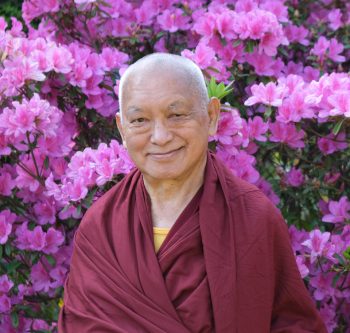
Lama Zopa Rinpoche at Kopan Monastery, Nepal, April 2020. Photo by Ven. Lobsang Sherab.
Lama Zopa Rinpoche continues his video teachings from Kopan Monastery in Nepal during the coronavirus pandemic.
This video begins with a young Kopan monk washing his hands and letting us know that he is washing the stains of delusion from himself and all sentient beings. In this way, even the seemingly mundane task of washing the body can be utilized in the path to enlightenment for the benefit of all. Yes, even washing up can become a practice in bodhichitta mindfulness!
Lama Zopa Rinpoche begins this teaching remind us that if we wish to benefit all, if we wish for others to rely on us and trust us, we need bodhichitta.
What is bodhichitta?
Bodhichitta is a Sanskrit word meaning, as Rinpoche explains, “the precious thought of enlightenment”—the mind that wishes to achieve enlightenment in order to lead all other beings into that same state. It is the attitude of the bodhisattva, of the person who makes the compassionate vow to save others from suffering.
Rinpoche explains that to gain the trust of others, to be a virtuous friend to sentient beings, the best way to achieve this is through bodhichitta realization. To do this, one must learn and reflect on the bodhichittta teachings. At first, when one has a bodhichitta motivation, it might not be real, meaning, it might not be fully felt in the heart. However, through training the mind, this practice eventually leads to effortless bodhichitta. To begin on the path to bodhichitta, the key factor is a good heart. Then, slowly, slowly, one progresses toward bodhichitta.
The real purpose of life is to benefit others: to free them from oceans of samsaric suffering and to liberate them from the causes of that suffering—delusion and karma.
Due to this virus, the whole world is scared, Rinpoche observes. However, we do have the opportunity, and the responsibility, to transform this suffering into happiness. Rinpoche explains that he is not talking about short-term happiness, but rather, utilizing this crisis in the path to enlightenment for numberless sentient beings. One can use their own suffering—sickness or whatever problem one is having, as well as all pleasure one experiences—to achieve enlightenment for others. If you get the virus, for example, no matter how much pain you experience, you can make it worthwhile. You can experience it for sentient beings. When you are able to do that, this is the best life, according to Rinpoche. This is the greatest purification and the way to collect most extensive merit.
Rinpoche reminds us that Buddha was like us. He had problems and suffering the same as we do. But, he cherished others. He changed his mind and cherished others more than himself, despite hardships, and achieved enlightenment for you! This gives us courage to know we can achieve this ourselves, and it also gives us strength to know that Buddha is here for us, through his teachings.
Everything exists in mere name, but if one doesn’t have the merit to understand, one thinks this is nihilism, that nothing exists. Rinpoche says, This thinking is where suffering comes from. The root of all suffering that beings experience, including the coronavirus, is ignorance. By realizing emptiness, this stops ignorance. Therefore, Buddha taught about dependent arising.
Rinpoche warns that what the “I” is, is so unbelievably subtle that one needs to meditate to see it. What we think is real now, this is a hallucination. A worldly person can have so much education and science, but seeing the truth of “I” is so rare. So, what appears and what you believe, in reality, is not true.
Rinpoche asks that we pray for all people who are sick and particularly those who have the coronavirus.
We invite you to go deeper into the topics presented here, plus many others, by watching Rinpoche’s video and reading the full transcript of Rinpoche’s teaching.
Watch Lama Zopa Rinopche’s teaching “Use Pleasure and Suffering to Achieve Enlightenment and Experience the Virus for Numberless Sentient Beings”:
https://youtu.be/jSZCrZMrqdk
- Read the transcript of Rinpoche’s teaching “Use Pleasure and Suffering to Achieve Enlightenment and Experience the Virus for Numberless Sentient Beings.”
- Rinpoche quotes verses from Khunu Lama Rinpoche’s Verses in Praise of Bodhichitta, published in English as Vast as the Heavens, Deep at the Sea.
- Dedication verses for COVID-19 Crisis Teachings
Find more video teachings by Lama Zopa Rinpoche from Kopan Monastery during the COVID-19 crisis:
https://fpmt.org/media/streaming/teachings-of-lama-zopa-rinpoche/lama-zopa-rinpoche-teachings-in-kopan-2020-during-covid-19-crisis/
Practice advice from our teachers, Dharma study-from-home opportunities, and more can be found on the page “Resources for the Coronavirus Pandemic.”
Lama Zopa Rinpoche is the spiritual director of the Foundation for the Preservation of Mahayana Tradition (FPMT), a Tibetan Buddhist organization dedicated to the transmission of the Mahayana Buddhist tradition and values worldwide through teaching, meditation and community service.
- Tagged: advice from lama zopa rinpoche, coronavirus, covid-19, lama zopa rinpoche thought transformation video teaching, video
16
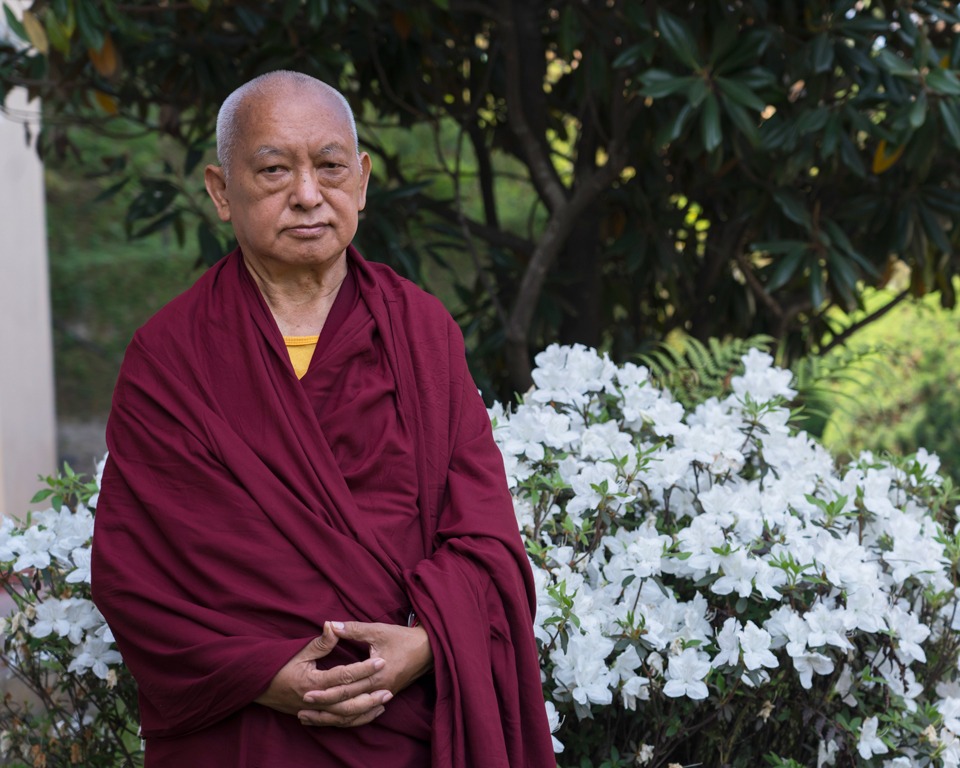
Lama Zopa Rinpoche at Kopan Monastery, Nepal, April 2020. Photo by Ven. Lobsang Sherab.
Lama Zopa Rinpoche continues his video teachings from Kopan Monastery in Nepal during the coronavirus pandemic.
This new video begins with a short powerful message from Geshe Ngawang Sangye, sharing Shantideva’s wisdom, from A Guide to the Bodhisattva’s Way of Life: “If a problem can be solved, what reason is there to be upset? If there is no possible solution, what use is there to being sad?” Geshe Sangye suggests that the way to combat mental and physical challenges produced from the lockdown is to remember that “every cloud has a silver lining” and many good things can be learned from staying indoors, such as preparing the mind to look for solutions to beat the coronavirus internally—including distancing ourselves from negative thoughts, not just from social situations.
Lama Zopa Rinpoche begins his teaching by explaining that through actualizing the path—especially wisdom directly realizing emptiness—one eliminates the subtle hallucination, the negative imprint left by delusion—this becomes totally purified. There is no more learning and one becomes enlightened.
What is the path? And how can we actualize it?
Rinpoche acknowledges that due to the coronavirus pandemic, so many people in the most affected countries are scared due to many people getting sick and dying. However, we can utilize anything, big or small—unfavorable things, undesirable things, and even pleasures and happiness in the life—all can be transformed into the path to enlightenment, not just short-term happiness—total cessation of gross and subtle mistakes of the mind, and the completion of realizations.
How can we use this crisis to get enlightened?
Rinpoche says we can. Right now, due to our obscured mind, we see the pandemic as a “crisis,” as difficult. We believe in it, we buy into the story of it. Like we are dreaming but don’t realize we are dreaming. We can transform this experience into the path to enlightenment, great liberation, peerless happiness—not just short-term happiness.
Rinpoche explains that this is how to make one’s life meaningful and not wasted, not “garbage.” Not just to benefit oneself, but also to benefit every single being in every realm. We make our life meaningful and cause ultimate happiness for them. This is being wise, using our lives to benefit others, and not wasting it on benefiting only ourselves.
We hold the wrong view that sentient beings—people and animals—are there to be used by us for our pleasure. However, Rinpoche explains, that by cherishing them, as we cherish ourselves, then we realize that all suffering comes from “I,” and all happiness comes from others.
If we want happiness, we have to create the cause for happiness and abandon the cause for suffering. We say we want happiness, and believe we want happiness, but we typically use our life in a way that creates suffering. However, we are so fortunate to have met the Dharma, to learn new methods for creating the cause for real happiness.
Every sentient being who is not free from samsara (suffering in rebirth, old age, sickness, death, and all the worldly pleasures that are also in the nature of suffering) needs to be liberated from the root of suffering: delusion and karma, and the ignorance that holds the “I” as truly existent.
With Dharma, one can continue and develop.
Rinpoche assures us that Buddha’s teachings contain no betrayal, no deception. Of course, when one is a beginner, it is important to examine and assess the teachings, and if one has the merit, one is able understand and discover the teachings and develop stable devotion. With no devotion, one analyzes, but without merit, no discovery comes, and one remains very skeptical. Rinpoche explains that in the West, we often are very clever, but don’t always have the merit to discover the teachings and instead focus our energies on short-term happiness in this life alone. To become enlightened, to cease all of the obscurations of the mind, and to come to all the realizations—what one needs to do is purify the mind and collect merit.
Rinpoche reminds us that Buddha’s holy name, the profound mantras, and prayers contain so much benefit. By reciting for yourself or for other sentient beings like animals, even on dead bones or hair of animals or people (including when one is eating meat), you can help purify the negative karma of that being.
In conclusion, Rinpoche made the strong point that there is nothing more beneficial to do with one’s life—job, family, extensive education, your own body—nothing else brings a more meaningful life than practicing Dharma.
We invite you to go deeper into the topics presented here in summary, plus many others, by watching Rinpoche’s video and reading the full transcript of Rinpoche’s teaching.
Watch Lama Zopa Rinopche’s teaching “Don’t Make Your Life Garbage and the Buddha’s Teachings Are Unbetraying”:
https://youtu.be/ueYg7Zrhlcg
- Read the transcript of Rinpoche’s teaching “Don’t Make Your Life Garbage and the Buddha’s Teachings Are Unbetraying.”
- In this video, Rinpoche mentions several mantras, including Shayamuni Buddha’s name and mantra, that can be found on our “Mantras” page.
- Read Recognizing the False I, a commentary written by Lama Zopa Rinpoche on and set of simple meditation techniques for identifying the object to be refuted— what Rinpoche calls “the false I”—during reflections on emptiness.
- In the dedication, Rinpoche recites the dedication verses from Nagarjuna’s Jewel Garland, v. 483–485.
Find more video teachings by Lama Zopa Rinpoche from Kopan Monastery during the COVID-19 crisis:
https://fpmt.org/media/streaming/teachings-of-lama-zopa-rinpoche/lama-zopa-rinpoche-teachings-in-kopan-2020-during-covid-19-crisis/
Practice advice from our teachers, Dharma study-from-home opportunities, and more can be found on the page “Resources for the Coronavirus Pandemic.”
Lama Zopa Rinpoche is the spiritual director of the Foundation for the Preservation of Mahayana Tradition (FPMT), a Tibetan Buddhist organization dedicated to the transmission of the Mahayana Buddhist tradition and values worldwide through teaching, meditation and community service.
- Home
- News/Media
- Study & Practice
- About FPMT Education Services
- Latest News
- Programs
- New to Buddhism?
- Buddhist Mind Science: Activating Your Potential
- Heart Advice for Death and Dying
- Discovering Buddhism
- Living in the Path
- Exploring Buddhism
- FPMT Basic Program
- FPMT Masters Program
- FPMT In-Depth Meditation Training
- Maitripa College
- Lotsawa Rinchen Zangpo Translator Program
- Universal Education for Compassion & Wisdom
- Online Learning Center
- Prayers & Practice Materials
- Overview of Prayers & Practices
- Full Catalogue of Prayers & Practice Materials
- Explore Popular Topics
- Benefiting Animals
- Chenrezig Resources
- Death & Dying Resources
- Lama Chopa (Guru Puja)
- Lama Zopa Rinpoche: Compendium of Precious Instructions
- Lama Zopa Rinpoche: Life Practice Advice
- Lama Zopa Rinpoche Practice Series
- Lamrim Resources
- Mantras
- Prayer Book Updates
- Purification Practices
- Sutras
- Thought Transformation (Lojong)
- Audio Materials
- Dharma Dates – Tibetan Calendar
- Translation Services
- Publishing Services
- Teachings and Advice
- Find Teachings and Advice
- Lama Zopa Rinpoche Advice Page
- Lama Zopa Rinpoche: Compendium of Precious Instructions
- Lama Zopa Rinpoche Video Teachings
- ༧སྐྱབས་རྗེ་བཟོད་པ་རིན་པོ་ཆེ་མཆོག་ནས་སྩལ་བའི་བཀའ་སློབ་བརྙན་འཕྲིན།
- Podcasts
- Lama Yeshe Wisdom Archive
- Buddhism FAQ
- Dharma for Young People
- Resources on Holy Objects
- Ways to Offer Support
- Centers
- Affiliates Area
- Teachers
- Projects
- Charitable Projects
- Make a Donation
- Applying for Grants
- News about Projects
- Other Projects within FPMT
- Support International Office
- Projects Photo Galleries
- Give Where Most Needed
- FPMT
- Shop
Translate*
*powered by Google TranslateTranslation of pages on fpmt.org is performed by Google Translate, a third party service which FPMT has no control over. The service provides automated computer translations that are only an approximation of the websites' original content. The translations should not be considered exact and only used as a rough guide.Unlike an external enemy, the inner enemy cannot regroup and launch a comeback once it has been destroyed from within.








